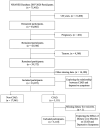Moderating role of live microbe between chronic inflammatory airway disease and depressive symptoms
- PMID: 40357036
- PMCID: PMC12066434
- DOI: 10.3389/fnut.2025.1572178
Moderating role of live microbe between chronic inflammatory airway disease and depressive symptoms
Abstract
Purpose: Our study aims to investigate the impact of dietary live microbe on the relationship between chronic inflammatory airway diseases (CIAD) and depressive symptoms.
Methods: We selected data from the NHANES database from 2007 to 2020. First, we explored the relationship between CIAD and depressive symptoms using logistic regression analysis. And subgroup analyses were conducted to demonstrate the relationship and whether there was an interaction effect between the two in each subgroup. Then, we further analyzed the effect of live microbe on depressive symptoms in CIAD patients. And subgroup analyses were conducted to assess whether the effect of dietary viable microbial levels on depressive symptoms held true in each subgroup and whether there was an interaction effect.
Results: A study included 23,072 participants, of whom 5,111 were diagnosed with CIAD, and 5,110 had live microbial information available. Multivariate logistic regression analysis revealed that, compared to those without CIAD, individuals with CIAD had an increased risk of depressive symptoms. Subgroup analysis indicated that, except for educational level and smoking status, all other subgroups demonstrated that CIAD increased the risk of depressive symptoms. Additionally, within the CIAD population, a higher level of live microbe was associated with a reduced risk of depressive symptoms. It is implied that live microbe can negatively modulate the relationship between CIAD and depressive symptoms. Subgroup analysis further showed no significant interaction effects across subgroups (p > 0.05).
Conclusion: Chronic inflammatory airway diseases can increase the risk of developing depressive symptoms. Dietary live microbe negatively modulate the relationship between CIAD and depressive symptoms. High levels of dietary live microbe significantly reduced the risk of depressive symptoms in patients with CIAD.
Keywords: chronic inflammatory airway disease; cross-sectional studies; depressive symptoms; dietary live microbe; microbiotherapy.
Copyright © 2025 Li, He, Bai, Wen, Hu, Deng and Huang.
Conflict of interest statement
The authors declare that the research was conducted in the absence of any commercial or financial relationships that could be construed as a potential conflict of interest.
Figures


References
-
- Adeloye D, Song P, Zhu Y, Campbell H, Sheikh A, Rudan I. Global, regional, and National Prevalence of, and risk factors for, chronic obstructive pulmonary disease (Copd) in 2019: a systematic review and modelling analysis. Lancet Respir Med. (2022) 10:447–58. doi: 10.1016/S2213-2600(21)00511-7, PMID: - DOI - PMC - PubMed
LinkOut - more resources
Full Text Sources

